
Clive Bull 1am - 4am
23 December 2022, 06:37 | Updated: 23 December 2022, 06:49
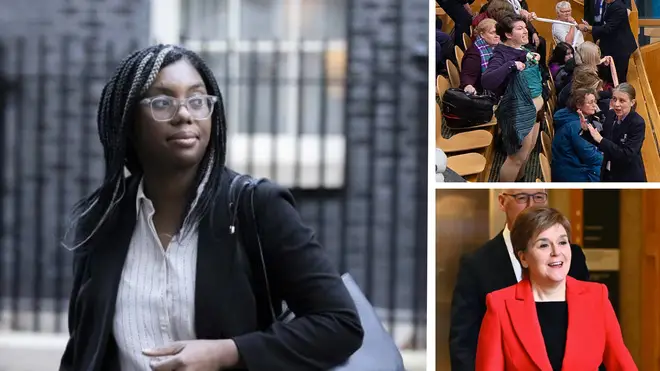
The British government is considering taking the "nuclear option" of blocking a controversial transgender law in Scotland amid fears male sexual predators could use the new rules to attack women.
The bill, which allows transgender people to self-identify without the backing of a doctor and lowers the legal age Scottish people can change gender from 18 to 16, was passed in Holyrood on Thursday to cheers, and jeers of "shame on you".
Critics say teens could put them on a path to medical treatment that is irreversible under the new rules.
They also argue that by removing the need for a medical diagnosis, male predators could claim to be women. Harry Potter author JK Rowling has warned that 'all a man needs to "become a woman" is to say he's one'.
The bill's supporters say it is an important step for trans rights and that nobody transitions on a "whim".
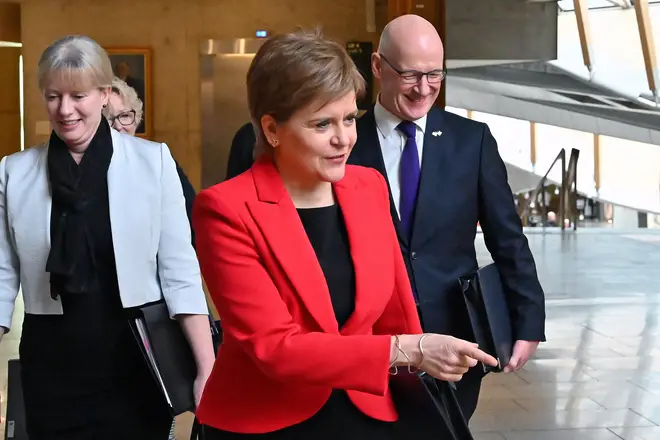
But ministers in Westminster are now considering stopping the bill from getting royal assent, the final step in becoming law, according to the Mail Online, although this would be unprecedented, and would cause huge controversy.
Under the Scotland Act, the British government can block a devolved bill for national security reasons, or for other reserved matters.
Ministers are concerned that the Scottish gender reform bill could have an impact on UK-wide equalities laws.
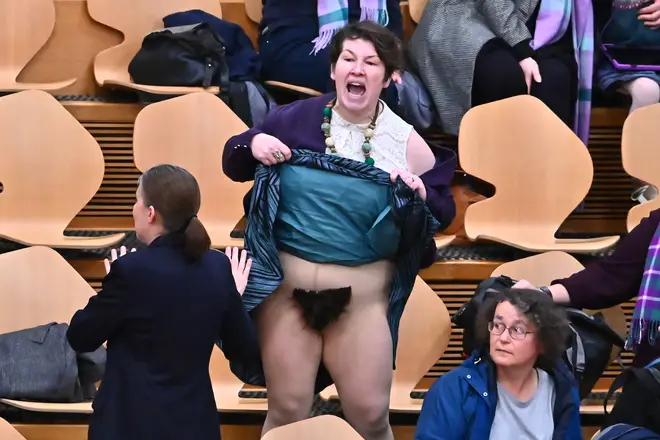
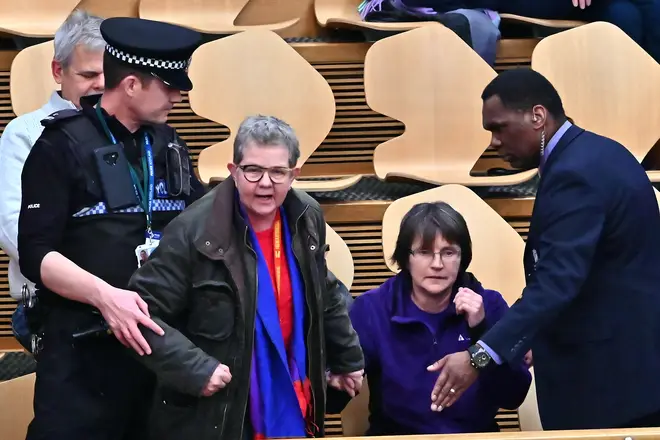
The British government has four weeks to decide whether to step in - and any attempts to intervene would likely be subject to a legal challenge themselves.
First Minister Nicola Sturgeon is also likely to use any attempts by Westminster to block the bill as ammunition for her argument that Scottish voters should be granted a second independence referendum.
A spokesperson for the Scottish government said: "The Bill as passed is within legislative competence, and was backed by an overwhelming majority, with support from all parties.
"Any attempt by the UK Government to undermine the democratic will of the Scottish Parliament will be vigorously contested by the Scottish Government."
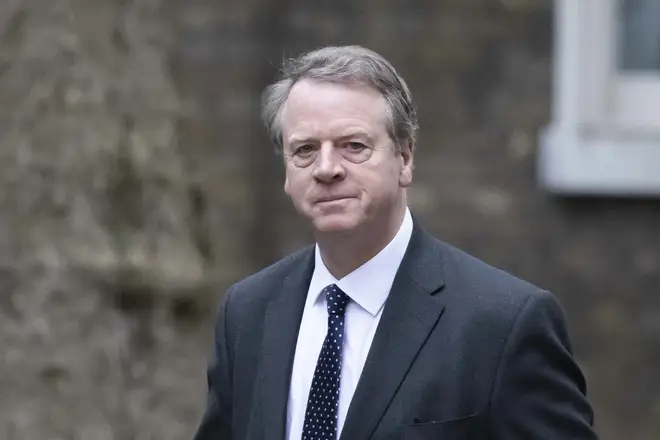
Alister Jack, the Scotland Secretary in Westminster, said he would "look closely" at the bill amid concerns for women's safety.
He said: "We share the concerns that many people have regarding certain aspects of this Bill, and in particular the safety issues for women and children.
"We will look closely at that, and also the ramifications for the 2010 Equality Act and other UK-wide legislation, in the coming weeks – up to and including a Section 35 order stopping the Bill going for royal assent if necessary."
A Westminster source told the Guardian that the possibility of stopping the bill reaching royal assent was: "The nuclear option, if you like."
They added: "The ideal, of course, is that we can point out to the Scottish government all the constitutional issues the bill creates as it stands, and they can amend it before it’s fully enacted. But we’re looking very seriously at all possibilities."
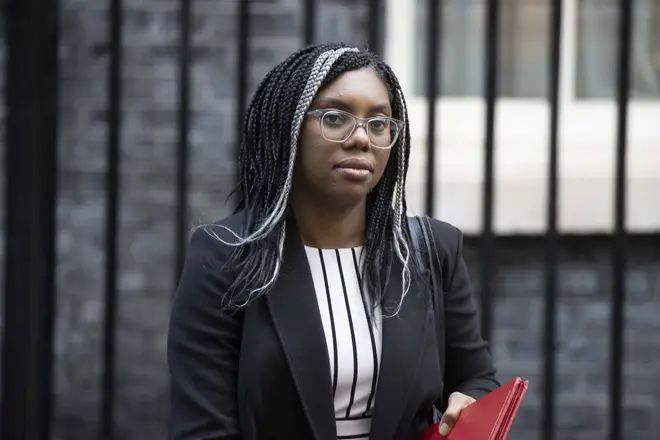
Kemi Badenoch, minister for women and equalities, has also spoken out about the effect of the bill on women's safety.
A source close to her said she "didn't believe the Scottish Government had considered the full impacts of this Bill – particularly on women and girls."
The source added: "She shares the strong concerns raised by the Equality and Human Rights Commission, the UN special rapporteur on violence against women and girls, and other civic groups and ministers regarding the impact this Bill will have on the functioning of the Equality Act, which is designed to protect all UK citizens."

Iain Dale transgender phone-in
The new bill also drops the time required for applicants to live in their acquired gender from two years to three months (or six for 16 and 17-year-olds).
It also adds a three-month "reflection period" before a gender recognition certificate is issued.
The bill also proved controversial in Scotland itself, causing rifts in the Scottish National Party (SNP), which saw its biggest rebellion in the history of the nation's parliament.
SNP minister Ash Reagan resigned in order to oppose the bill, and high-profile MP Joanna Cherry clashed with Nicola Sturgeon, having said party colleagues were 'scared to speak out' about gender reform ahead of the vote.

Parent of a transgender child talks on gender self-identificationt
There have also been internal divisions over the bill in Scottish Labour and the Scottish Conservatives, and protests were held inside and outside the parliament
The parliament was suspended after a protest during the final speech before the vote, with one woman lifting up her dress to reveal fake genitalia, and earlier a woman had shouted "no one is listening to women".
The bill finally passed on Thursday afternoon 86 to 39 in favour to loud applause from the gallery, with Scottish Labour and the Scottish Lib Dems supporting the bill with the majority of SNP/Green MSPs.
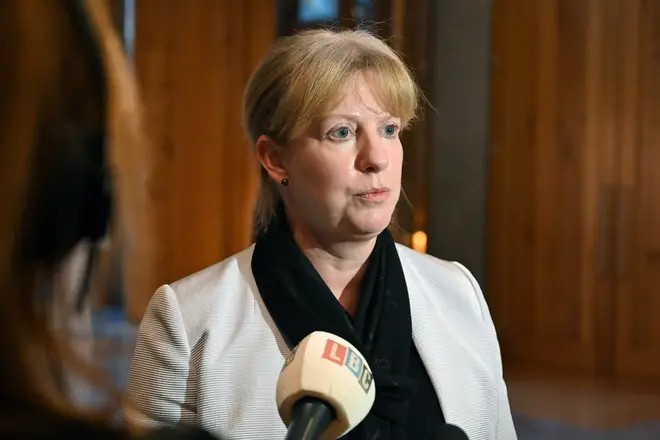
Speaking in the final debate on it today, Social Justice Secretary Shona Robison said: “Every party in this chamber except one made a clear commitment to the reforms set out in this Bill at the last Scottish election, and at the one before that it was all parties.
“Trans rights are not in competition with women’s rights, and as so often before, we can improve things for everyone when those discriminated against act as allies, not opponents.”
Read more: Caller urges people to focus on how Gender Recognition Bill 'benefits young trans people'
Scottish Tory MSP Rachael Hamilton said the Bill showed "Parliament at its worst”, adding: “In the rush to make the process a little easier for trans people, the Government is making it easier for criminal men to attack women. That’s the problem here.”
But Labour’s Pam Duncan-Glancy said it gives parliamentarians “one of those rare moments… where we all have a real opportunity to improve lives and directly tackle inequality”.The Glasgow MSP said it will help “society to accept them (trans people) and to support them to be their best selves, without barriers or additional costs or medicalisation”.